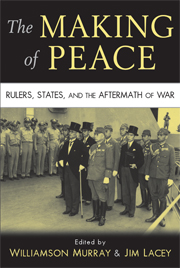Book contents
- Frontmatter
- Contents
- Preface: concluding peace
- 1 Introduction: searching for peace
- 2 The Peace of Nicias
- 3 “A swift and sure peace”: the Congress of Westphalia 1643–1648
- 4 The Peace of Paris, 1763
- 5 In search of military repose: the Congress of Vienna and the making of peace
- 6 War and peace in the post–Civil War South
- 7 Vae victoribus: Bismarck's quest for peace in the Franco-Prussian War, 1870–1871
- 8 Versailles: the peace without a chance
- 9 “Building buffers and filling vacuums”: Great Britain and the Middle East, 1914–1922
- 10 Mission improbable, fear, culture, and interest: peace making, 1943–1949
- 11 The economic making of peace
- 12 Ending the Cold War
- 13 Conclusion: history and the making of peace
- Index
- References
12 - Ending the Cold War
Published online by Cambridge University Press: 05 June 2012
- Frontmatter
- Contents
- Preface: concluding peace
- 1 Introduction: searching for peace
- 2 The Peace of Nicias
- 3 “A swift and sure peace”: the Congress of Westphalia 1643–1648
- 4 The Peace of Paris, 1763
- 5 In search of military repose: the Congress of Vienna and the making of peace
- 6 War and peace in the post–Civil War South
- 7 Vae victoribus: Bismarck's quest for peace in the Franco-Prussian War, 1870–1871
- 8 Versailles: the peace without a chance
- 9 “Building buffers and filling vacuums”: Great Britain and the Middle East, 1914–1922
- 10 Mission improbable, fear, culture, and interest: peace making, 1943–1949
- 11 The economic making of peace
- 12 Ending the Cold War
- 13 Conclusion: history and the making of peace
- Index
- References
Summary
The end of the Cold War was a miraculous event. The struggle had lasted for forty-five years, embraced every continent, and seen the mobilization of tens of millions of soldiers, tens of thousands of nuclear weapons, and uncountable billions of dollars. Nevertheless, it concluded swiftly, peacefully, and, most important, without direct military conflict between the two principal belligerents. Such a denouement is virtually unprecedented in the history of great power rivalries. Athens and Sparta, France and England, the Habsburgs and the Bourbons, Austria and Prussia, Germany and France (and Britain and Russia) – all of these long-standing rivalries and many more led to major military conflict at least once and often many times. The peaceful resolution of the Cold War was amazing and unique.
The leaders of the two belligerent states deserve the praise of history for bringing about such an improbable ending. Yet, the resulting peace, thus far, has suited neither side well. The United States, of course, benefited economically and socially from the end of the Cold War on a grand scale, but American foreign policy rapidly spiraled into confusion and disarray. New threats came to the fore as the Soviet Union left the scene, and the United States found itself unprepared to think about them coherently or to deal with them effectively.
The post–Cold War peace has proven even more unsatisfactory for the Russians. They have seen political benefits in the form of democracy and economic benefits, admittedly spread unevenly across the country.
- Type
- Chapter
- Information
- The Making of PeaceRulers, States, and the Aftermath of War, pp. 323 - 355Publisher: Cambridge University PressPrint publication year: 2008



